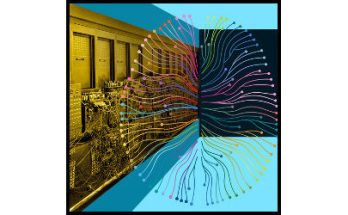“When Hackers Were Heroes”
Communications of the ACM, April 2021, Vol. 64 No. 4, Pages 28-34
Historical Reflections
By Thomas Haigh
“What was exceptional about MIT was not that it had a computer or that unkempt programmers were devising impressive tricks. It was that MIT had enough computers that a couple of surplus machines could be left out for members of the community to play with.”
“The original hackers were neither destructive nor dedicated to the pilfering of proprietary data, unlike the online vandals and criminals who later appropriated the word.”
Forty years ago, the word “hacker” was little known. Its march from obscurity to newspaper headlines owes a great deal to tech journalist Steven Levy, who in 1984 defied the advice of his publisher to call his first book Hackers: Heroes of the Computer Revolution. Hackers were a subculture of computer enthusiasts for whom programming was a vocation and playing around with computers constituted a lifestyle. Levy locates the origins of hacker culture among MIT undergraduates of the late-1950s and 1960s, before tracing its development through the Californian personal computer movement of the 1970s and the home videogame industry of the early 1980s. (The most common current meaning of hacker, online thieves and vandals, was not established until a few years later).
Hackers was published only three years after Tracy Kidder’s The Soul of a New Machine, explored in my last column (January 2021, p. 32–37), but a lot had changed during the interval. Kidder’s assumed readers had never seen a minicomputer, still less designed one. By 1984, in contrast, the computer geek was a prominent part of popular culture. Unlike Kidder, Levy had to make people reconsider what they thought they already knew. Computers were suddenly everywhere, but they remained unfamiliar enough to inspire a host of popular books to ponder the personal and social transformations triggered by the microchip. The short-lived home computer boom had brought computer programming into the living rooms and basements of millions of middle-class Americans, sparking warnings about the perils of computer addiction. A satirical guide, published the same year, warned of “micromania.” The year before, the film Wargames suggested computer-obsessed youth might accidentally trigger nuclear war.
Making hackers into heroes, rather than figures of fun or threat, was a bold move. Even within the computing community, “hacker” was an insult as often as a point of pride. Managers lamented the odd work habits and unmaintainable code produced by those who programmed for love rather than money, while computer scientists decried the focus of the hackers on practice over theory. According to Levy, though, “beneath their often unimposing exteriors, they were adventurers, risk-takers, artists.” His book established a glorious lineage for the amateur programmers of the 1980s, crediting their tribe with the invention of videogames, personal computing, and word processing.
The Hacker Ethic
There is a good chance you have read Levy’s book, which sits perennially near the top of Amazon’s computer history bestseller list and received more than 130 new citations in 2020. Even if you have not, you have probably come across his list distilling the “hacker ethic” into six bullet points. Levy proclaimed it “their gift to us” with “value even to those of us with no interest at all in computers.” It goes:
- Access to computers—and anything that might teach you something about the way the world works—should be unlimited and total. Always yield to the Hands-On Imperative!
- All information should be free.
- Mistrust authority—promote decentralization.
- Hackers should be judged by their hacking, not criteria such as degrees, age, race, sex, or position.
- You can create art and beauty on a computer.
- Computers can change your life for the better.
Like an anthropologist visiting a remote tribe, Levy had the outsider perspective needed to recognize and document the core assumptions of an unfamiliar culture. In a sense those bullet points are timeless. If you are reading Communications you surely recognize some of these beliefs in yourself or in people you have worked or studied with. Yet reading the list is no alternative to understanding these beliefs in their original context. In this column I provide that context.
The MIT Hackers of the 1960s
The first part of the book, explaining the origins of the hacker ethic at MIT, is by far the most influential. The word hack was engrained in MIT’s culture. Like other students, MIT students liked to play pranks. For gifted and highly competitive engineers, pranking was a chance to show off with breathtaking but pointless feats of engineering creativity. The quintessential MIT hack took place in 1984, when what appeared to be a campus police car appeared on top of the Great Dome.
Computer programs that demonstrated great skill yet served no apparent utilitarian function could also be “hacks.” The computer hacker community formed around MIT’s TX-0 computer from about 1958, expanding when one of the first minicomputers, a Digital Equipment Corporation PDP-1, was installed in 1962. MIT was then a world leader in computing, thanks to clusters of expertise built around Project Whirlwind (an early digital computer that became a prototype of the SAGE air defense network), pioneering work on timesharing (which became Project MAC), and the Artificial Intelligence lab founded by John McCarthy and Marvin Minsky.
About the Author:
Thomas Haigh is a professor of history at the University of Wisconsin—Milwaukee and a Comenius Visiting Professor at Siegen University. He is the author, with Paul Ceruzzi, of A New History of Modern Computing to be published by MIT Press later this year. Learn more at www.tomandmaria.com/tom. [Direct link to the book “A New History of Modern Computing.”]
Further Reading from the author:
- Pretty much anything by Levy is worth reading. My personal favorite is his 1984 essay “A Spreadsheet Way of Knowledge” (republished as https://www.wired.com/2014/10/a-spreadsheet-way-of-knowledge/), a deeply perceptive appreciation of the early impact of spreadsheet software. If you enjoyed Hackers because it shows eccentric men doing stubbornly creative things in academic environments then you are more likely to enjoy his follow-ups Artificial Life: The Quest for a New Creation (Pantheon, 1992) and Crypto: How the Code Rebels Beat the Government, Saving Privacy in the Digital Age (Viking, 2001) than his later books on Apple, Facebook, and Google.
- I already mentioned the work of Chris Kelty and Gabriella Coleman on hacker culture. But if you are interested in how the other sense of hacker, the online vandal or data thief, came to predominate, then there are several key books from the 1980s that helped to spread the new meaning to a world still unfamiliar with online communication. These include Out of the Inner Circle by Bill Landreth and Howard Rheingold (Microsoft Press, 1985) and The Cuckoo’s Egg: Tracking a Spy Through the Maze of Computer Espionage by Clifford Stoll (Doubleday, 1989).
- Law professor and activist Lawrence Lessig played a crucial role in broadening the free software movement to a more general free culture movement. His classic contribution, Code: and Other Laws of Cyberspace (Basic Books, 1999) remains readable and provocative.
- Levy stressed the playful nature of early hacker culture. A similar sensibility drove cult 1979 favorite Gödel, Escher, Bach: An Eternal Golden Braid (Basic Books, 1979), by physicist turned cognitive scientist Douglas Hofstadter. Although Hofstadter denies any personal interest in computers, his book showcases the hacker fondness for word play, recursion, baroque music, mathematical codes, and the manipulation of symbols.
See also:
- Lawrence Lessig, “Code: And Other Laws of Cyberspace, Version 2.0” Published by Basic Books (2nd Revised ed. edition December 5, 2006)
- Steven Levy, “Hackers: Heroes of the Computer Revolution” Published by O’Reilly Media (May, 2010)
- Steven Levy, “Facebook: The Inside Story” Published by Blue Rider Press (February 25, 2020)
- Steven Levy, “In the Plex: How Google Thinks, Works, and Shapes Our Lives” Published by Simon & Schuster (April 12, 2011)
- Walter Isaacson, “Steve Jobs” Published by Simon & Schuster (September 15, 2015)
- Walter Isaacson, “The Innovators: How a Group of Hackers, Geniuses, and Geeks Created the Digital Revolution” Published by Simon & Schuster (October 6, 2015)
- WarGames (1983 Movie), Wikipedia entry.
- For several other titles please see article references.






